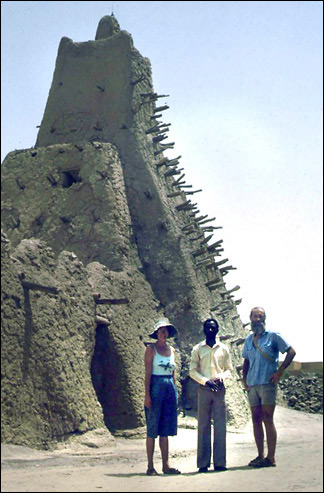 Diana Hottell, Bob Jones and (center) a political
dissident exiled to Timbuktu stand in front of a 14th century mud mosque, part of the University of Timbuktu. The high school teacher-dissident was exiled for two years to Timbuktu. Some dissidents were sent to even more remote places—to the sale mines north of Timbuktu.Every
morning I woke up covered with desert sand over my sleeping
bag, with Sahara sand in my ears, in my mouth and in my
nostrils. Then Al Khamis (whom I looked on as “Huckleberry
Finn of Timbuktu”) would go on his morning rounds to bring
us water which we boiled on the little blue gas stove.
Then we began the routine of gulping water that was still
too hot to drink. Several times I singed my mouth on the
scalding hot water, but immediately started boiling up
another pot. It seemed like we spent all morning just
boiling enough water.
The drinking water on the Niger riverboat had been truly
foul. Each dinner table had four quart bottles of water,
but the water was drawn directly from the Niger, sometimes
where raw sewage had been dumped directly into the river.
So I noticed upon closer inspection that the “drinking
water” contained small chunks of solid matter, possibly
chunks of human feces. Thus I learned to boil the water
every morning up on our rooftop home in Timbuktu.
We had arrived at Timbuktu in the seventh or eighth year
of a famine. So many cattle and people had died from the
drought in the southern Sahara that about 15,000 desert
refugees had moved into reed shelters around the town
and doubled the population of Timbuktu. Since the famine
was still in effect, there was very little food available
in the open-air markets except a few onions, tuberous
roots and bullion cubes. We could buy piping hot bread
at a couple of street-corner ovens. A woman would pull
the round and flat loaves of bread from the fire-heated
beehive oven and quickly fling them onto the ground which
was entirely sand. They were too hot to handle. We could
buy warm bread a minute later, but all the loaves were
covered in a generous layer of sand. If fact, all the
food in Timbuktu contained windblown sand. Every time
we ate a meal we chewed on sand along with the food. I
didn’t realize the effect until we returned home to Twisp
a year later and I sat in the dentist’s chair. When I
opened my mouth the dentist cried in alarm, ”What in the
world have you been chewing on? Your gold crowns are pitted
like the craters of the moon!”
In the glory days of Timbuktu in the 14th and 15th centuries
the city stood on the banks of the great river, but today
the Niger has changed course and moved four miles to the
south. So the night we departed Timbuktu we were ferried
in a long dugout canoe along a marshy canal for four miles
through the blackest midnight. The African boatman skillfully
guided the dugout through the darkness where the only
sound that broke the silence was the slight swish of his
long pole in the water.
The boatman dropped us at the Niger landing where the
riverboat would be arriving. But nobody knew what time.
Probably sometime tonight. There is a great joke played
on outsiders who visit West Africa. The riverboats do
have printed timetables, but the official schedule bears
no relationship whatsoever to the actual arrival times
of the boats. For example, when we had first begun the
Niger adventure and boarded the riverboat near Bamako,
the vessel was eighteen hours late in starting. And that
was at the beginning of the voyage! Early in the trip
the boat got stuck on a sandbar where all passengers had
to be off-loaded into dugout canoes and taken to the nearest
village. This was a mere twelve hour delay in the “schedule.”
Meanwhile, I was sitting in the dark beside the river
when a Sahara sandstorm blew in. The winds were blowing
so fiercely that the entire contents of my shirt pockets
were blown away – I never found a trace of them – including
the priceless little notebook of my diary jottings. So
I just wrapped my turban tightly around my face and head,
squeezed my eyes closed and lay down in the desert sand
to get away from the whirling wind and sand. I busrrowed
deep into the sand and pulled into the fetal position.
I felt exactly like a helpless baby as the howling winds
blew the Sahara sands. Sand blew into my eyes and scratched
the right eyeball so badly that the eye would not heal
for several days.
The riverboat finally arrived for us sometime before
sunrise, but during that blackest night of my life in
the swirling sandstorm I had several hours to realize
just how far off the beaten track I had journeyed. Mark
Twain’s fictional character had inspired me to seek out
fabled Timbuktu here at the end of the world in the Sahara
Desert. |

